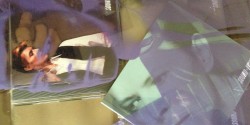While watching the news last night I was hit hard by the anchor’s announcement of breaking news that David Bowie had died. What?! It was just a few days ago that we were collectively celebrating Bowie’s birthday on social media and over the airwaves. I had just gotten a press release on Thursday from Seattle radio station KEXP announcing that Friday was being declared International Bowie Day. The press release stated, “It’s the influence of David Bowie that inspired Northwest Polite Society (NWPS) to organize International David Bowie Day in conjunction with KEXP and Independence Printage. January 8, 2016 is David Bowie’s 69th birthday and also marks the release of Bowie’s new album, Black Star.”
The 12 hour KEXP special played, “selections from every era of Bowie’s remarkable career, including rare recordings, live performances, collaborations, productions, music from artists that inspired Bowie, artists he inspired…” according to KEXP. I’m sure the KEXP archives are getting a workout today, as fans seek out Bowie recordings in order to come to terms with his death. You can listen to KEXP’s Intergalactic Bowie Day here.
Like many people, I have my own David Bowie stories and memories. My best friend and I even camped out (back when you were allowed to do that) for David Bowie tickets one summer when we were home from college. My sister and her good friend swapped places with us in line at one point, so that we divided up the time spent bundled on the sidewalk in front of the record store that sold the tickets. By the time the show came around, we were brimming with excitement. It was the summer of 1987 and Bowie played Spartan Stadium at San Jose State University at a much anticipated show that was part of his “Glass Spider” tour.
I loved it.
In the days following the show, I opened the San Jose Mercury and was crest-fallen to read a music reviewer’s critique of the concert. The headline read, “Bowie San Jose Fans Watch Rock’s Man of a Thousand Guises Get Caught in His Own Web.” Ouch! I was incensed as I read further. Writer Harry Sumrall wrote, “…[he] presented a show that was by turns silly and superfluous, irritating and simply dumb. A performer known for his theatricality, Bowie seemed to be trying to outdo himself and his image. Inadvertently, he somehow managed to deliver a parody of both.”
I was so peeved about the review that I penned my own retort, which was published in the San Jose Mercury (much to my pleasure). From what I remember, I wrote a letter to Sumrall basically saying that I felt sorry for him. I suggested that as a critic he is no longer able to let himself get absorbed by a great show anymore because he is required to analyze it.
Interestingly, Sumrall received so many angry letters about his review that he wrote a follow up piece defending the article. About a month after the show, he wrote,
From the many letters the Mercury News has received about that review, it seems that 30,000 fans went to see Bowie’s show and all of them liked it, except the guy who was sent to write about it. While letters can be misleading — due to the phenomenon in which only those who disagree bother to write in — it is obvious from the response, and the response of the crowd at Bowie’s concert, that the critic was in a distinct minority.”
He goes on to explain that he is a fan of Bowie, but was disappointed by the show and even points out that it’s different to attend the show as a paying fan than as a critic (hmm. Kind of what I said in my letter to him), saying,
Fans go to a concert for fun or excitement or, occasionally, to listen to music — but it is the critic’s job to attend and comment on what is seen and heard. The fans pay to attend — the critic is paid (by the newspaper) to do the same. Because of these differences, the roles of the two differ in the ways in which they perceive a concert — the fan is just that, a fan, who wants to be at a show, has paid for the privilege and often regards both as a vote of confidence for the performer. The critic has no such ties. Whether he is a fan of the performer or detests that performer, work is work, and the responsibility to perform that work becomes all important. And that work is to express an opinion. In the case of Bowie, that opinion was as obvious as the review, namely, that Bowie shortchanged himself and his fans with a vapid stage show that neglected his inspiring music for stale theatrics.”
Yep, his response pretty much confirmed what I was guessing as a 20-year-old concert goer: the critics weren’t having as much fun at the show as the fans. For a long time this feeling stuck with me and is probably why I was reluctant to seek out employment in the music business. I feared that working in music or writing about music would zap the enjoyment out of it.
With time and age, though, I guess I have a little bit more of an understanding of where music writer Harry Sumrall was coming from. He’d probably be amused to hear that I did eventually get a job writing about music (my best job ever) and it didn’t actually destroy my enjoyment of music, thankfully.
But back to that 1987 David Bowie concert…Apparently the Glass Spider Tour was panned by many critics, but it may just have been another example of Bowie pushing boundaries and experimenting when critics and fans weren’t always prepared for those shifts.
In any event, I’m sad that Bowie is gone and will forever remember seeing him play a great show at Spartan Stadium. Critics be damned.



